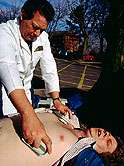Relatives who witness loved one's CPR fare better, study finds

(HealthDay)—Watching medical personnel perform CPR on loved ones whose hearts have stopped—efforts that typically end in patient death—may bode better for family members' mental health than being absent from the scene.
New research indicates these family members are far less likely to experience symptoms of post-traumatic stress disorder (PTSD), depression and anxiety after the event than those who didn't watch the CPR, regardless of the outcome.
The study, done in France, also found that family-witnessed cardiopulmonary resuscitation in the home didn't affect patient survival rates, emotional stress in the medical team or the number of legal claims in the months afterward.
The research examined a phenomenon that has long been controversial but backed up by little evidence, said study co-author Dr. Stephen Borron, program director of the medical toxicology fellowship program at Texas Tech University Health Sciences Center in El Paso.
"I guess I was surprised there wasn't a greater perception of stress among [medical personnel]," Borron said. "If you asked physicians or other caregivers about having relatives in the room while resuscitation was taking place, most would anticipate the stress levels being higher, and this study didn't bear this out."
The research is published March 14 in the New England Journal of Medicine.
Cardiac arrest accounts for 600,000 deaths each year in industrialized countries, and only 4 percent of patients in the study survived a month beyond CPR efforts. More than 80 percent of sudden cardiac arrests occur outside hospital settings—which was the case for all the patients in this research.
Another paper in the same issue of the New England Journal of Medicine, however, indicated that nearly 60 percent of elderly patients suffering cardiac arrest in the hospital survived for at least one year.
Borron and his colleagues analyzed 570 relatives of patients given CPR by 15 French emergency medical service units that were randomly assigned to either offer or not offer the family member the option of observing CPR (some relatives not offered the option stayed anyway).
Nearly eight in 10 relatives offered the opportunity to observe CPR did so, compared with 43 percent of the relatives in the "control" group. Three months later, family members who hadn't witnessed CPR were 60 percent more likely to have experienced symptoms related to post-traumatic stress disorder than those who stayed, along with more frequent symptoms of anxiety and depression.
Borron noted that those who watched CPR efforts may have been more satisfied that everything possible had been done to save their loved one, with no suspicion or lingering questions.
The experience may also offer them the opportunity for a last goodbye and ability to grasp the reality of death, although CPR efforts depicted on fictional TV shows typically lend an unrealistic—and often rosier—outcome, said Borron and Dr. James Downar, a critical care and palliative care physician at Toronto General Hospital.
In a hospital setting, Downar said, "I'm afraid you may be in for a bit of a rough experience, because it's not like it is on TV, where it's clean, antiseptic, and with good outcomes."
According to Downar, who is also an assistant professor of medicine at University of Toronto, "A routine resuscitation for an inpatient includes putting a breathing tube in, shocking with paddles and putting in a central line [catheter]. We're talking about something that can appear violent, disfiguring and even bloody. In this study, central lines were not a common event at all."
Downar, who authored an editorial accompanying the new study that recommends against family presence during in-hospital CPR, praised Borron's research as "clever and pragmatic," but noted that the chaos of in-hospital CPR may be more traumatic for family members to witness than similar efforts at home. It's nearly impossible to tell which relatives may be prone to PTSD symptoms, Downar said, pointing out that all five relatives in Borron's study who attempted suicide afterward had witnessed CPR.
"This was not a study of family presence versus non-family presence," Downar said. "Family presence during some part of the arrest or resuscitation was almost universal. Some of the family members in the control group were even performing CPR [before rescuers arrived]. I don't know that we can look at this data and conclude that family presence makes it better. But the intervention included other things, such as an identified support person, who may have caused the improved outcomes."
Borron said further research on the subject is necessary—preferably studies that focus on family-witnessed CPR in the United States, both at home and in the hospital.
"I think we have to be cautious in extrapolating the results of this study from France to the U.S., in that their [emergency medical system] is very different from ours," Borron said. "But I think many physicians may be willing to examine their thought process on this."
More information: The U.S. National Library of Medicine offers more on CPR.
Health News
Copyright © 2013













